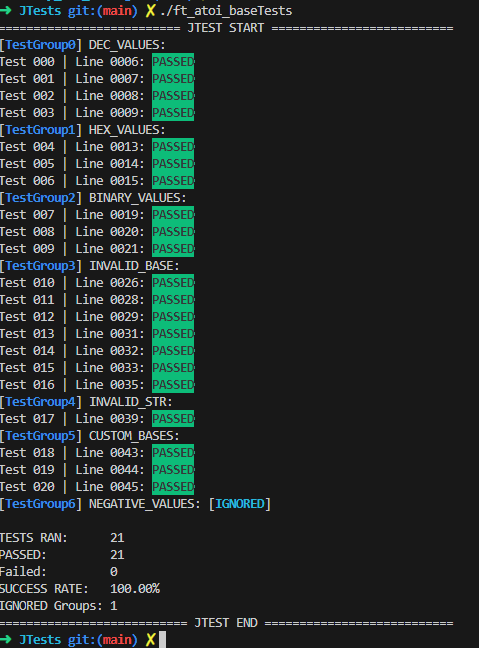██╗██╗ ██╗███████╗████████╗ ████████╗███████╗███████╗████████╗
██║██║ ██║██╔════╝╚══██╔══╝ ╚══██╔══╝██╔════╝██╔════╝╚══██╔══╝
██║██║ ██║███████╗ ██║ █████╗ ██║ █████╗ ███████╗ ██║
██ ██║██║ ██║╚════██║ ██║ ╚════╝ ██║ ██╔══╝ ╚════██║ ██║
╚█████╔╝╚██████╔╝███████║ ██║ ██║ ███████╗███████║ ██║
╚════╝ ╚═════╝ ╚══════╝ ╚═╝ ╚═╝ ╚══════╝╚══════╝ ╚═╝
Just-Test or Jt for short is your test-harness made in C for C, with the goal of making it as easy as possible for C devs to integrate unit testing and test-driven development(TDD) into their workflow.
- How to Build and Use
- General Structure of a Test file
- Test Groups
- Assertions
- Additional Features
- Contributing
- Examples
- you can either build the library to use everywhere in the future:
$> make lib $> gcc -o Test MyTestFile.c jt.a
- Or you can compile it using the makeFile:
>> change FILE=<path_to_your_file> $> make
- BONUS:
- you can directly override variables in the makeFile like this:
$> make FILE=<path_to_your_file>
- Check LIBASM where I did add Tests for under the Linux Section.
- Your test file must Contain:
- main with at leats
JTEST_STARTandJTEST_END, which defines the block where you call the tests. - You can call induvial TestGroups Using
runTest(); or run all tests usingrunAll(); - A definition of
Jsetup() andJcleanup(), you can leave them empty if you don't need them.
- main with at leats
- your test file can have multiple testGroups declared.
- Multiple Assertions to make sure everything works well.
- If you Assertions are for the same purpose consider Grouping them under a TestGroup.
- Here is a declaration example ensuring the output of the add function:
TEST_START(AddOutputChecks) ASSERT_INT32_EQU(3, add(1,2)); ASSERT_INT32_EQU(-5, add(6, -11)); TEST_END
- TestGroups can be flaged to be ignored and not ran by JTEST, using the optional param
IGNORE_TEST:TEST_START(AddOutputChecks, IGNORE_TEST) ASSERT_INT32_EQU(3, add(1,2)); ASSERT_INT32_EQU(-5, add(6, -11)); TEST_END
- Assertions are your building blocks, they support all generic types for example:
ASSERT_UINT32_EQU(3, add(1,2)); ASSERT_INT32_EQU(-5, add(6, -11)); ASSERT_FLOAT_EQU(3.14, PI);
- And also supports some useful formats, and types for example:
ASSERT_HEX_EQU(0x45, 0x43); ASSERT_STR_EQU("Hello", s);
- you can also test your own types using
ASSERT_DATA_EQUfor example:/*More Information Available in the TestExamples.c*/ typedef struct vector{ int x; int y; } _vector; _vector v1 = {.x = 0, .y = 6}; _vector v2 = {.x = 0, .y = 6}; ASSERT_DATA_EQU(&v1, &v2, cmpVector, printVector);
=> Jtest Work on the Standard Error By default making it easier to dump it's output to a log file.
=> Jtest offers a No-Colors mode to make it well presented in a log file where colors will not show up (check Makefile).
Contributions are very welcome! Feel free to open issues or pull requests for bug fixes, improvements, or new features.
| atoiBase | jtestExample |
|---|---|
 |
 |